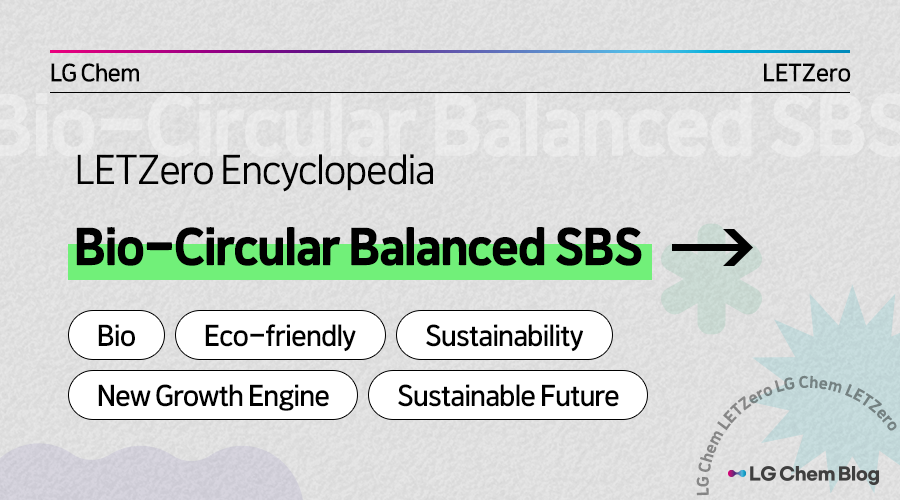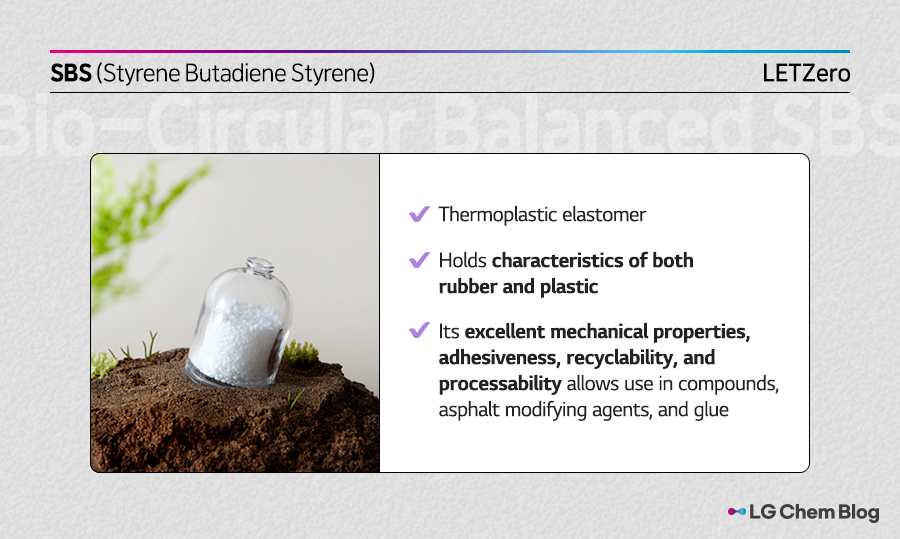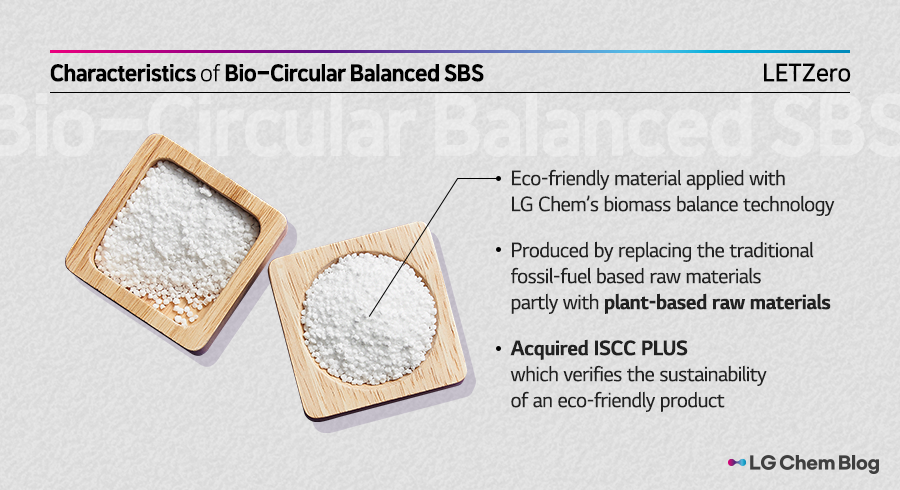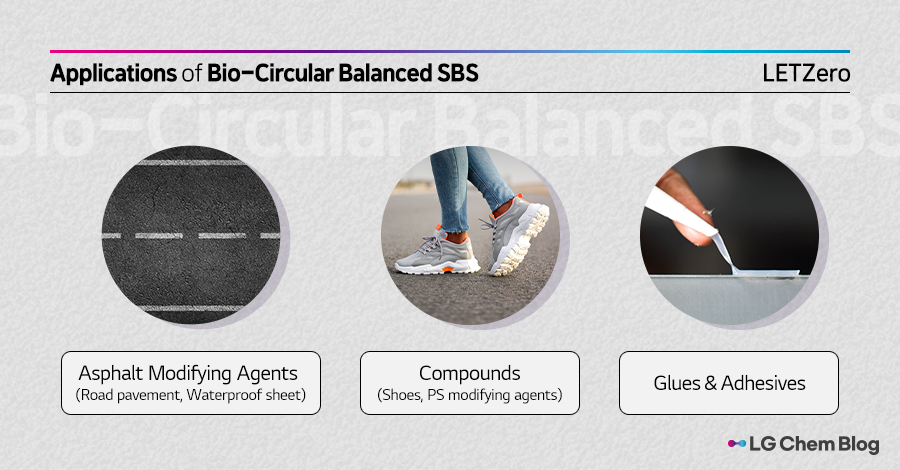LETZero Encyclopedia: Bio-Circular Balanced SBS – Eco-friendly special resin holding properties of both plastic and rubber
2024. 04. 19
2024. 04. 19

Welcome to LETZero Encyclopedia, an introductory series to LG Chem’s eco-friendly brand LETZero and their products. The previous episode addressed Bio-Circular Balanced SSBR, an eco-friendly rubber material used in green/high-functional tires. Today, we take a look at the characteristics and usages of Bio-Circular Balanced SBS, an eco-friendly special resin applied with renewable bio raw materials.

First, let’s skim through what SBS (Styrene Butadiene Styrene) is. SBS is a thermoplastic elastomer made by polymerizing two monomers: Styrene and Butadiene. Depending on the type of coupling agent* used, SBS can come with a linear or radial structure. In general, products with lower molecular weight have a linear structure, whereas those with higher molecular weight have a radial structure. The most notable feature of SBS is that it holds the properties of both rubber and plastic. At room temperature, it shows excellent elasticity similar to rubber. At a high temperature, it can melt down, just like plastic. SBS boasts outstanding mechanical properties such as tensile strength, elongation, and elasticity. Moreover, it offers high adhesiveness, recyclability, and processability. Thanks to these features, SBS can be applied for various usages, including shoe outsoles, compound in PS modifying agents, asphalt modifying agents, and solvent-based/hot-melt adhesives.
*Coupling agent: A substance used to strengthen the bond between two different materials

Bio-Circular Balanced SBS is an eco-friendly bio SBS material applied with LG Chem’s biomass balance technology. While utilizing the existing infrastructure for petrochemical production, it uses raw materials that are more environmental than traditional materials. Bio-Circular Balanced SBS is produced with an input of plant-based raw materials, such as waste cooking oil and plant byproducts, instead of traditional fossil-fuel based raw materials. Using bio raw materials in place of fossil-fuel based materials can significantly cut down the carbon emissions. This not only applies to raw materials. The production process of Bio-Circular Balanced SBS also involves the use of renewable energy, such as hydro and solar power generated at an eco-friendly plant, in order to lessen the burden on the environment.
LG Chem’s Bio-Circular Balanced SBS has acquired ISCC Plus, a verification of the product’s sustainability. ISCC Plus is an international certificate which corresponds to EU (European Union)’s Renewable Energy Directive. Known for its transparent examination guidelines and strict procedure, ISCC (International Sustainability & Carbon Certification) has become an authority of eco-friendly certification, gaining public trust.

With high elasticity, recovery from deformation, and processability, Bio-Circular Balanced SBS is used in various products such as asphalt modifying agents, compounds in shoe outsoles and PS modifying agents, and glues/adhesives. In particular, it is receiving attention as an effective asphalt modifying agent. Let’s learn about what asphalt modifying agent is, and what role SBS plays in it.
Asphalt modifying agent is a substance used to boost up the performance of an asphalt. General asphalt (unmodified) is easily deformed by heat, or exposed to cracks at a low temperature. Polymer Modified Asphalt (PMA) is a product which provides a better quality by complementing the heat-resistance and durability of general asphalt and improving its strength, elasticity, and flexibility. To make this modified asphalt, we add up to 5~10% of SBS into the product.
A distinct feature of LG Chem’s Bio-Circular Balanced SBS is the reduced particle size through the company’s exclusively-developed catalyst system. Thanks to its high resilience, when applied to asphalt modifying agents, it can minimize the deformation and improve the physical properties of asphalt at both high and low temperatures. In fact, modified asphalt can extend the lifespan of a road pavement up to twice that of general asphalt. Since it improves the thermo-sensitivity* of asphalt and cuts down 40% of the maintenance cost of general asphalt, the global demand for modified asphalt is prospected to rise continually. According to the market research group, Business Research Insights, the global SBS modified asphalt market size was valued at USD 7267 million in 2020 and is expected to grow at an average annual rate of 3.8%, reaching USD 11069.51 million by 2031.
*Thermo-sensitivity: The extent to which the properties of asphalt change depending on external temperature. Higher thermo-sensitivity means asphalt is highly affected by the temperature.
So far, we looked at LG Chem’s Bio-Circular Balanced SBS. The next LETZero Encyclopedia will come back with a story of PCR PVC.

There are no comments yet! Be the first to let us know your thoughts!